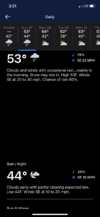-
Hello, please take a minute to check out our awesome content, contributed by the wonderful members of our community. We hope you'll add your own thoughts and opinions by making a free account!
You are using an out of date browser. It may not display this or other websites correctly.
You should upgrade or use an alternative browser.
You should upgrade or use an alternative browser.
Misc Winter Weather Support Group
- Thread starter RBR71
- Start date
Its great seeing the Red Spruce come back.The one time I went to Mt Mitchell! Apparently I was lucky it wasn’t fogged in! View attachment 147351
Y’all post all the pictures of Uranus that you take today! 

NBAcentel
Member
Definitely a sign of the apocalypse.
Brick can tell you for free alsoHaving a hard time justifying $300 a year for models to tell me it isn't going to snow. I am fairly certain wral can tell me that for free...
And really everything is mostly free on other sites...except for the weeklies and we know how accurate those have been.
View attachment 147390
Word.Brick can tell you for free also
Can’t find the sports thread, but TW starting out with a birdie at The Masters, always a good thing!







